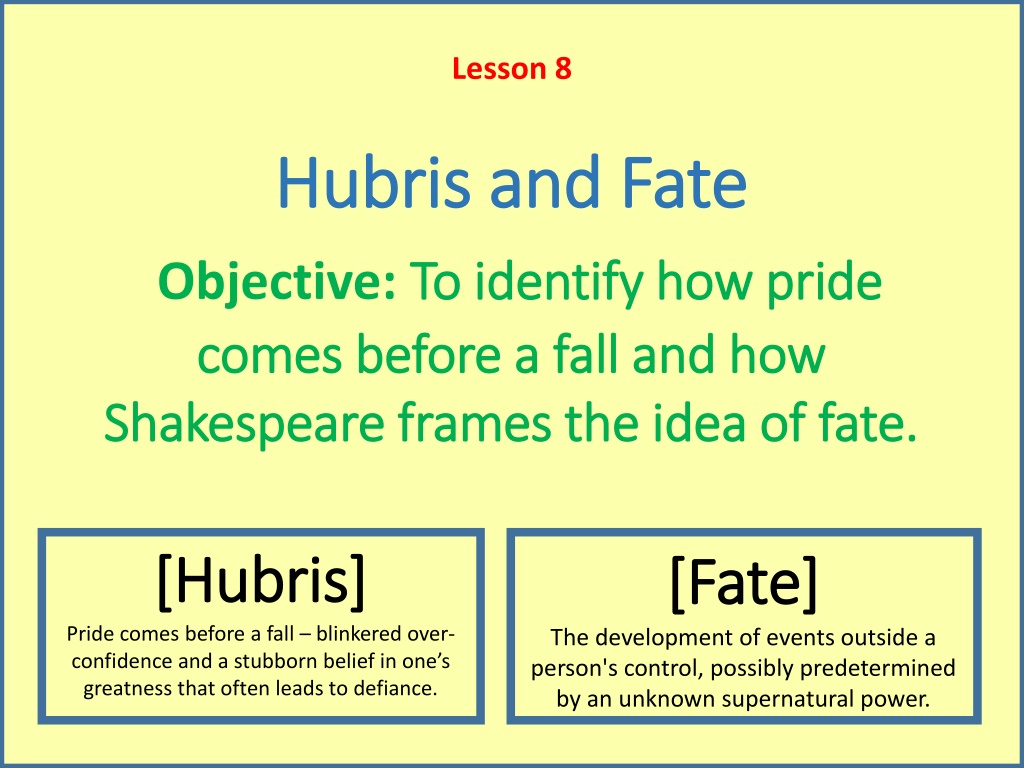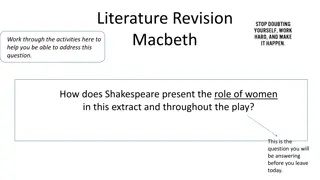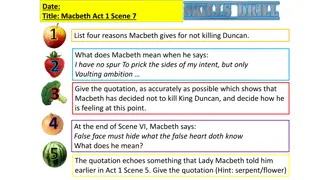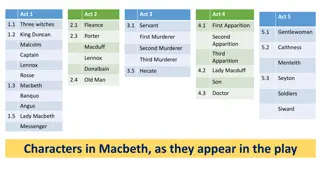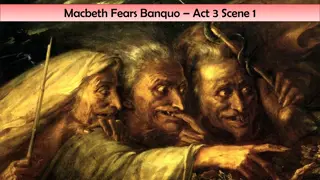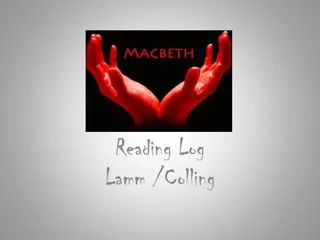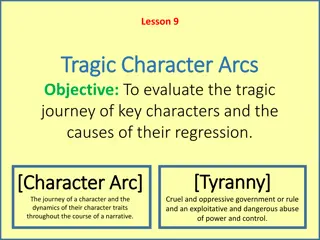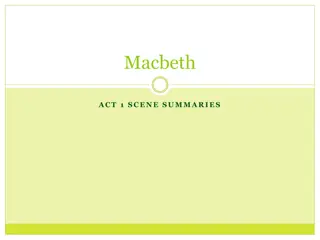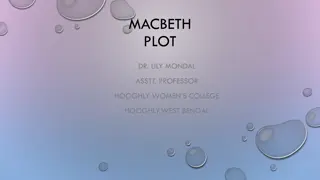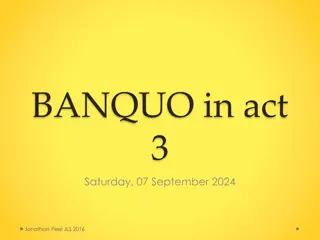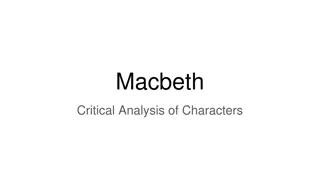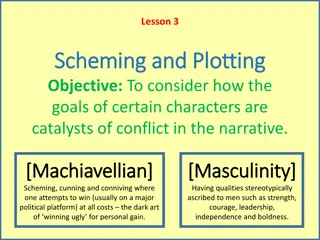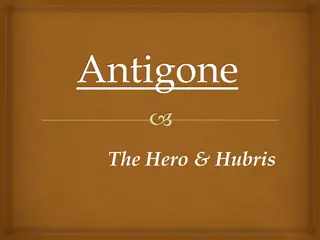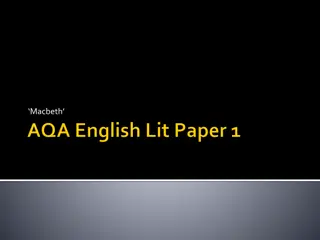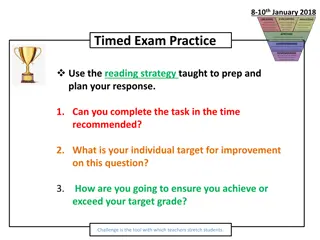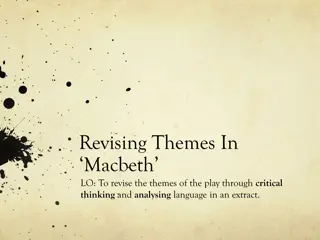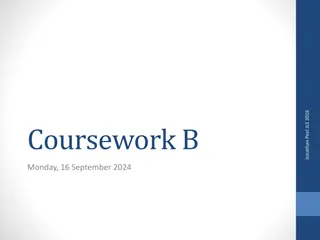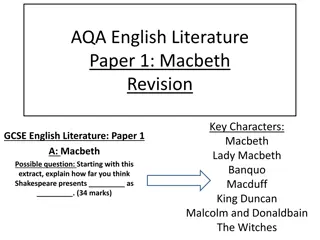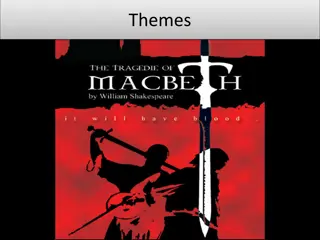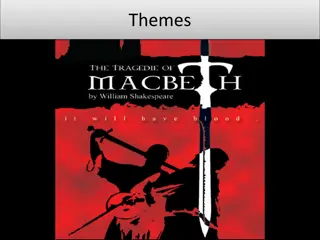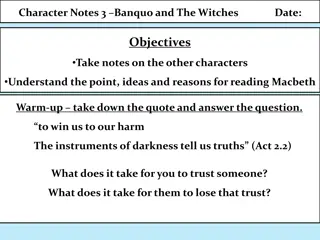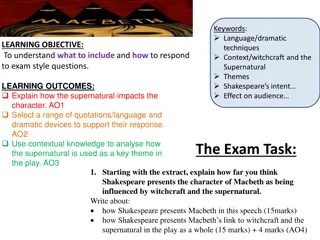Exploring Hubris and Fate in Shakespeare's Macbeth
In this lesson on Hubris and Fate in Shakespeare's Macbeth, students will delve into the themes of pride leading to downfall and the idea of fate shaping events beyond one's control. Through the analysis of key scenes and characters, the lesson aims to deepen understanding of how Shakespeare frames these concepts in the play.
Download Presentation

Please find below an Image/Link to download the presentation.
The content on the website is provided AS IS for your information and personal use only. It may not be sold, licensed, or shared on other websites without obtaining consent from the author. Download presentation by click this link. If you encounter any issues during the download, it is possible that the publisher has removed the file from their server.
E N D
Presentation Transcript
Lesson 8 Hubris and Fate Hubris and Fate Objective: To identify how pride To identify how pride comes before a fall and how comes before a fall and how Shakespeare frames the idea of fate. Shakespeare frames the idea of fate. [Hubris] [Hubris] Pride comes before a fall blinkered over- confidence and a stubborn belief in one s greatness that often leads to defiance. [Fate] [Fate] The development of events outside a person's control, possibly predetermined by an unknown supernatural power.
TEACHERS GUIDE Lesson Structure 8 Hubris and Fate Objective To identify how pride comes before a fall and how Shakespeare frames the idea of fate. Starter PPT slide - Rank famous faces from most proud to least proud. Reading Act 4 Scene 1 The Three Witches New Prophecies Scene Analysis PPTs Act 3 Scenes 5-6 Act 4 Scene 1 Film Clip (on estream Macbeth Fassbender version) Not featured in film. Main (optional could be set as Homework tasks). PEEL Paragraph How does Shakespeare present the supernatural and the notion of fate in Macbeth ? Plenary What If what if you were Macbeth, how would you respond to the Three Witches prophecies? Key terms Hubris, Fate, Spirituality, Occult.
STARTER CELEBRITY EGOS Rank famous faces from most proud to the most humble.
CLASS READING Act 4 Scene 1 Act 4 Scene 1 New Prophecies From New Prophecies From The Three Witches The Three Witches
PEEL TASK How does Shakespeare present the supernatural How does Shakespeare present the supernatural and the notion of fate in Macbeth ? and the notion of fate in Macbeth ?
Act 3 Scene 3 Analysis Act 3 Scene 3 Analysis Scheming - Macbeth has planned to kill both Banquo and Fleance because the witches told them that Banquo s sons would be kings - Macbeth s murder plot shows that he is challenging fate same fate that crowned him Thane of Cawdor and the Crown wants to outsmart prophecies if they go against him. Witches prophecies real danger is Fleance. Significant murder scene sends third murderer after the first two this shows his lack of trust for anyone the downward spiral Second Murderer - we ve lost the best half of our affair Selective - Macbeth is so inconsistent and changeable, he believes what he wants to believe prophecies that benefit him (yes), prophecies that don t (no) immature character, not a clever and noble man. Playing with fate - If he believes in the same fate that has brought him to this point, his efforts to murder Banquo and Fleance are useless. - What s worse murdering them or trying to counter fate? Macbeth is on a downward spiral .
Act 3 Scene 4 Analysis Act 3 Scene 4 Analysis The Celebration Feast - attempts to endear himself to society going overboard to make everybody welcome. - Macbeth s chance to put all deeds to rest. - The hearty welcome , We will require her welcome , They are welcome , Be large in mirth , Love and health to all - Macbeth can t hide the evil that he s indulged in. Coincidence - The fact that the murderer enters just as everyone is seated for the feast is very important. Supernatural - Macbeth is unable to sit with his guests just as he is unable to stand with them in society (in terms of honour and respect). - Macbeth s seat at the banquet is taken by Banquo s bloodied ghost. - Dramatic irony and dramatic tension Macbeth is confronted by an apparition that only he can see symptom of guilt (hallucination?) - - After conspiring for Banquo s murder, to find his ghost sitting at the table in his seat is profound dramatic irony. - Macbeth panics, becomes hysterical and upsets all of his guests. - Echoes prophecy from the witches that Banquo s son will come to the throne. Lady Macbeth tries to allay the guests fears: - tells them that he sometimes behaves like this nothing to worry about. - sit my worthy friends, my lord is often thus and have been from his youth . Chaos - Despite Macbeth s efforts, the feast ends in disorder and disarray symbolic of how he is trying to get people on his side to bring society together fails spectacularly. - The reason for his failure are the deeds that he has committed to get to this point. Escalation - M and LM hoped to just kill King Duncan and no more but the crime has opened up a sequence of events where escalating crimes are to be committed the whole plan is unravelling. Alienation - Macbeth s attempts to fit in with nobles and lords from society however, this outburst alienates him everything begins to crumble and he starts to feel that he is alone in the world. - Macbeth and wife LM tries to rally round him, but then tells them to leave, then becomes quiet (drained by her broken spirit). - The only time we see LM after this point is when she is sleepwalking where we see the full torment of her mind. - Macbeth s murderous tendencies are now increasing. Rivers of blood I am in blood, stepped so far , That I should wade no more, returning were as tedious as to go o er past the point of no return Macbeth s murderous nature has grown whilst LM has shrunk.
Key Terms Glossary Key Terms Glossary Language Structure/Narrative Context/concept Analogy - comparison between one thing and another, typically for the purpose of explanation or clarification. Catalyst an element which enters a narrative which causes a reaction usually an increase in conflict and tension. Ambition - desire and determination to achieve success. Emotive language - describes words and phrases meant to evoke an emotional response to a subject. Dramatic irony when the audience is aware of information that the character is not aware of. Hierarchy system where citizens are ranked according to relative status or authority. Iambic Pentameter - a line of verse ten syllables in length each consisting of one short (or unstressed) syllable followed by one long (or stressed) syllable. Enigma mystery and ambiguity developed for dramatic effect withholding of information for the purposes of the narrative. Historical context - refers to the moods, attitudes, and conditions that existed during a certain time. Imperatives command words (usually verbs). Foreshadowing - a warning and indication of a future event. Hubris excessive pride which inevitably leads to one s downfall. Oxymoron - a figure of speech in which apparently contradictory terms appear in conjunction example: fair is foul and foul is fair Irony - the expression of one's meaning by using language that normally signifies the opposite, typically for humorous or emphatic effect. Loyalty - giving or showing firm and constant support or allegiance. Personification human characteristics given to a nun-human form. Motif a repletion of a certain idea or symbol in a narrative Machiavellian - cunning, scheming, and unscrupulous, especially in politics Pun - a joke exploiting the different possible meanings of a word or the fact that there are words which sound alike but have different meanings. Semantic Field - a lexical set of semantically related items, or simply, words and phrases with a similar meaning or context to the subject. Patriarchy - a system of society or government in which men hold the power and women are largely excluded from it. Rhetorical question - a question asked in order to create a dramatic effect or to make a point rather than to get an answer. Suspense - a state or feeling of excited or anxious uncertainty about what may happen Regicide - the deliberate killing of a monarch Soliloquy - an act of speaking one's thoughts aloud when by oneself especially by a character in a play. Tyranny - cruel and oppressive government or rule.
Act 3 Scene 5 Analysis Act 3 Scene 5 Analysis This scene may have been added by actors rather than Shakespeare himself. - the Witches were popular characters for audiences. - Hecate has many lines. witches appear differently in this scene. they treat Macbeth as the poor victim of their plotting at the beginning, here, they treat him as if they are one of his own. - the Witches developing identification with Macbeth could be because he has become so evil that he has essentially become one of them. Hecate talks about how Macbeth s over- confidence has a bearing on the future - foreshadowing/echoing scene.
Act 3 Scene 6 Analysis Act 3 Scene 6 Analysis Regicide even though Macbeth killed his predecessor, he is still the lawfully crowned King. - Kings and members of the Royal Family may have watched the play in the Globe Theatre. - Shakespeare has to be careful with this weighty theme. Catalyst - why must Macbeth be removed from the throne. Scotland - How do people feel about Macbeth and the state of the country? Macbeth s antagonist - Macduff is in England seeking help of the King there to help remove Macbeth in Scotland. Unsympathetic protagonist - Macbeth is preparing to move against Macduff s family this makes it difficult to have any sympathy for Macbeth whatsoever his murderous intent has spiralled. - Macbeth s motivation for killing Macduff s family is a structural technique in the narrative from Shakespeare context and reason for Macbeth and a device to bring the audience out of the claustrophobic mind of Macbeth and back into the reality of the play. Catalyst an element which enters a narrative which causes a reaction usually an increase in conflict and tension.
Act 4 Scene 1 Analysis Act 4 Scene 1 Analysis Three Witches - theme of deception and equivocations - appearances vs. reality half truths, metaphorical masks from the witches. - hideous ingredients are put into the cauldron (echoes Macbeth s banquet where everything fell apart and ended in ruin). - the witches prepare their very own special feast which reflects the evil which has been committed by Macbeth in the play. - Macbeth enters Act 1 with the witches with bravado and confidence echoing Hecate s prophecy in Act 3 Scene 5 that Macbeth s overconfidence would bring his downfall (hubris). Apparition #3: Malcolm s Son - coming to Macbeth s castle carrying a branch from a tree. - Idea that Macbeth can t be harmed because Burnhamwood moves to Dunceny - thinking that it is impossible for a forest to move, feels even more secure following the prophecy. - Macbeth reads into each of the prophecies on what he wants to see from them. Apparition #4: Eight Kings (Descendants of Banquo). he sees a line of eight kings who were all descendants of Banquo. - this leaves him in an awful state no-one descended from him will inherit the throne. - curious that Macbeth sees this but still doesn t doubt the earlier prophecies the witches have been playing with him. Development of Macbeth s character. - however evil, each murder has a purpose but now, he has decided that he will commit murders on a whim without thought. - from this moment, the very first things of my heart should be the first things on my hand - he plots to murder Macduff s wife and children in a terrible act this almost dehumanises him in our eyes now a cold-hearted killing machine it is difficult to have any sympathy for him or to see him as anything else other than a monster at this point. This is where the last ounce of sympathy that we had for him dissipates. Structural device used by Shakespeare - looking for reassurance and comfort that what he has done will keep him on the throne. - the witches show three different apparitions which Macbeth interprets in his own way. these apparitions whilst seeming to comfort him are entirely deceptive and symptomatic of how the witches speak in riddles and half-truths. - the audience are shown a series of apparitions which are supposed to confirm one thing but can be interpreted as the complete opposite foreshadowing event Shakespeare is flagging something that will become crucial to the final outcome of the play. Apparition #1: The Armed Head - foretells Macbeth s eventual decapitation at the hands of Macduff. - Macbeth however, believes that the head is representative of Macduff misunderstands its true meaning. Apparition #2: The Bloodied Child - meant to represent Macduff no-one who hasn t been born of woman can hurt him. - Macbeth misreads the prophecy thinking that he has nothing to fear (deceptive prophecy).
Macbeth Lady Macbeth King Duncan Banquo Macduff Macbeth is a Scottish general and the Thane of Glamis who is greeted by prophecies from three witches that he will be made Thane of Cawdor. This comes true. He longs to become King and is then tempted into murder (partly by Lady Macbeth) to fulfill his ambitions to the throne. Once he commits his first crime (killing King Duncan), he is crowned King of Scotland. He is brave but not virtuous. Macbeth is courageous on the battlefield but ill-suited to politics, quickly becoming a tyrant. He becomes suspicious of even his close friends like Banquo. His response to every problem is violence and murder. Macbeth is never comfortable in his role as a criminal and this leads to a psychological regression. Macbeth s wife, a deeply ambitious woman who lusts for power and position. Early in the play she seems to be the stronger and more ruthless of the two, as she urges her husband to kill Duncan and seize the crown. After the bloodshed begins, Lady Macbeth falls victim to guilt and madness to an even greater degree than her husband. Her conscience affects her to such an extent that she eventually commits suicide. Interestingly, she and Macbeth are presented as being deeply in love, and many of Lady Macbeth s speeches imply that her influence over her husband is primarily sexual. Their joint alienation from the world, occasioned by their partnership in crime, seems to strengthen the attachment that they feel to each another. A Scottish nobleman hostile to Macbeth s kingship from the start. He eventually becomes a leader of the crusade to unseat Macbeth. The crusade s mission is to place the rightful king, Malcolm, on the throne, but Macduff also desires vengeance for Macbeth s murder of Macduff s wife and young son. The good King of Scotland whom Macbeth, in his ambition for the crown, murders. Duncan is the model of a virtuous, benevolent, and farsighted ruler. His death symbolizes the destruction of an order in Scotland that can be restored only when Duncan s line, in the person of Malcolm, once more occupies the throne. The brave, noble general whose children, according to the witches prophecy, will inherit the Scottish throne. Like Macbeth, Banquo thinks ambitious thoughts, but he does not translate those thoughts into action. In a sense, Banquo s character stands as a rebuke to Macbeth, since he represents the path Macbeth chose not to take: a path in which ambition need not lead to betrayal and murder. Appropriately, then, it is Banquo s ghost and not Duncan s that haunts Macbeth. In addition to embodying Macbeth s guilt for killing Banquo, the ghost also reminds Macbeth that he did not emulate Banquo s reaction to the witches prophecy. KEY CHARACTERS IN MACBETH Malcolm - The son of Duncan, whose restoration to the throne signals Scotland s return to order following Macbeth s reign of terror. Malcolm becomes a serious challenge to Macbeth with Macduff s aid (and the support of England). Prior to this, he appears weak and uncertain of his own power, as when he and Donalbain flee Scotland after their father s murder. Hecate - The goddess of witchcraft who works to enact her mischief on Macbeth (one of the three witches). Fleance - Banquo s son, who survives Macbeth s attempt to murder him. At the end of the play, Fleance s whereabouts are unknown. Presumably, he may come to rule Scotland, fulfilling the witches prophecy that Banquo s sons will sit on the Scottish throne. Macdonwald Traitor to the King whose army is defeated in battle by Macbeth and executed by King Duncan. Lennox - A Scottish nobleman. Ross - A Scottish nobleman. The Murderers - A group conscripted by Macbeth to murder Banquo, Fleance, Macduff s family (fails). Porter - The drunken doorman of Macbeth s castle. The Three Witches Three black and midnight hags who plot mischief against Macbeth using charms, spells, and prophecies. Their predictions prompt him to murder Duncan, to order the deaths of Banquo and his son, and to blindly believe in his own immortality. The play leaves the witches true identity unclear aside from the fact that they are servants of Hecate, we know little about their place in the cosmos. In some ways they resemble the mythological Fates, who impersonally weave the threads of human destiny. They clearly take a perverse delight in using their knowledge of the future to toy with and destroy human beings.
The Jacobean Era Elizabeth I and James I Historical Context Historical Context When Queen Elizabeth died in 1603, she had no children, or even nephews or nieces. The throne was offered to James Stuart, James VI of Scotland, who then became James I of Britain. Brought up by Protestant regents, James maintained a Protestant regime in Scotland when he came of age, and so was an acceptable choice for England which had become firmly Protestant under Elizabeth. James was a distant cousin of Elizabeth his ascension as King caused controversy amongst Catholic relatives (leading to Gunpowder Plot). Shakespeare was writing for the theatre during the reigns of two monarchs, Queen Elizabeth I and King James I. The plays he wrote during the reign of Queen Elizabeth, such as A Midsummer Night's Dream , are often seen to embody the optimistic mood of the Elizabethans. However, those he wrote during James's reign, such as Macbeth and Hamlet , are darker and more cynical, reflecting the insecurities of the Jacobean period. 1040 Macbeth is set in Medieval Scotland 1606 Macbeth is written in the Jacobean Era The Gunpowder Plot Shakespeare and James I The Divine Right of Kings Certain Catholics (Robert Catesby, Thomas Percy, Guy Fawkes and a few others) turned to terrorism during James I s Protestant rule, trying to blow up the Houses of Parliament in 1605. Macbeth was written the year after the Gunpowder Plot of 1605 and is considered a piece of propaganda in support of King James the message of the play: perpetrators of regicide will eventually receive their comeuppance. The conspirators were betrayed, and horribly tortured on the rack until they confessed. They were then executed in the most brutal fashion as a warning to other would-be traitors. Shakespeare s Macbeth wove direct references to the Plot including King James snake/flower medal. Whilst the present Queen claims constitutional impartiality, in the European Middle Ages, the Divine Right of Kings was a dominant concept. The idea claimed that kings were answerable only to God and it was therefore treachery to challenge them. To kill the king (regicide) was to challenge the direct of authority of God and was considered an unforgivable sin . James I ruled under the notion of the divine right of Kings . Shakespeare's play Macbeth may be a cautionary tale, warning any other potential regicides (king-killers) of the awful fate for this crime. Macbeth s victim, King Duncan is presented by Shakespeare as a noble, divinely- appointed ruler. Killing Duncan has catastrophic consequences for Macbeth and Scotland. Duncan could be a representation of James but might also allude to King Edward s healing the sick: 'such sanctity hath heaven given his hand'. Religious Beliefs Lady Macbeth and Role of Women in Jacobean Society The Real Macbeth Religious thinkers in the Middle Ages had upheld the idea of 'The Great Chain of Being'. This was the belief that God had designed an ordered system for both nature and humankind within which every creature and person had an allotted place. It was considered an offence against God for anyone to try to alter their station in life. In addition, madness was often seen as a moral issue, either a punishment for sin or a test of faith and character. Macbeth was a real 11th century Scottish king, but the historical Macbeth, who had a valid right to the throne, reigning in Scotland from 1040-57. He succeeded Duncan, whom he had defeated in battle, but the real Duncan was weak and a younger ignoble King. In reality, Macbeth was succeeded by his own stepson, not Malcolm, who came to the throne later. Banquo is a mythical figure. Shakespeare found his version of the story of Macbeth in the Chronicles of Holinshed Jacobean society was patriarchal (much like the majority of Western history). Female characters in Shakespearean tragedies were often passive (Hamlet s Ophelia submits stating I shall obey my Lord and Othello s Desdemona states To you I am bound . However, Lady Macbeth is a cunning, manipulative and dominant woman who is associated with the supernatural. Her introduction in Act 1 Scene 5, subverting submission when she stops reading Macbeth s letter, criticizes his nature as too full o th milkof human kindness . This behavior is controversial within the societal confines of a masculine hegemonic era in medieval Scotland. Regardless of her heroism or villainy, she is a radical figure for the era.
Key Terms Glossary Key Terms Glossary Language Structure/Narrative Context/concept Analogy - comparison between one thing and another, typically for the purpose of explanation or clarification. Catalyst an element which enters a narrative which causes a reaction usually an increase in conflict and tension. Ambition - desire and determination to achieve success. Emotive language - describes words and phrases meant to evoke an emotional response to a subject. Dramatic irony when the audience is aware of information that the character is not aware of. Hierarchy system where citizens are ranked according to relative status or authority. Iambic Pentameter - a line of verse ten syllables in length each consisting of one short (or unstressed) syllable followed by one long (or stressed) syllable. Enigma mystery and ambiguity developed for dramatic effect withholding of information for the purposes of the narrative. Historical context - refers to the moods, attitudes, and conditions that existed during a certain time. Imperatives command words (usually verbs). Foreshadowing - a warning and indication of a future event. Hubris excessive pride which inevitably leads to one s downfall. Oxymoron - a figure of speech in which apparently contradictory terms appear in conjunction example: fair is foul and foul is fair Irony - the expression of one's meaning by using language that normally signifies the opposite, typically for humorous or emphatic effect. Loyalty - giving or showing firm and constant support or allegiance. Personification human characteristics given to a nun-human form. Motif a repletion of a certain idea or symbol in a narrative Machiavellian - cunning, scheming, and unscrupulous, especially in politics Pun - a joke exploiting the different possible meanings of a word or the fact that there are words which sound alike but have different meanings. Semantic Field - a lexical set of semantically related items, or simply, words and phrases with a similar meaning or context to the subject. Patriarchy - a system of society or government in which men hold the power and women are largely excluded from it. Rhetorical question - a question asked in order to create a dramatic effect or to make a point rather than to get an answer. Suspense - a state or feeling of excited or anxious uncertainty about what may happen Regicide - the deliberate killing of a monarch Soliloquy - an act of speaking one's thoughts aloud when by oneself especially by a character in a play. Tyranny - cruel and oppressive government or rule.
PLENARY PLENARY What if you were Macbeth, how would you respond to the Three Witches prophecies?
